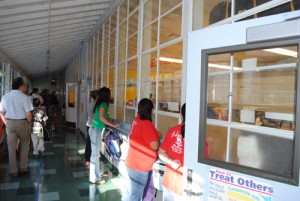District forecasts 28-point API gain

Idyllwild School (IS) students scored impressively in the annual California Standardized Testing and Reporting Program exams in language arts, mathematics, algebra, science, and history-social science.
As a result of those impressive category gains, IS principal Matt Kraemer said that Hemet Unified School District (HUSD), of which Idyllwild is a part, forecast that Idyllwild’s Academic Performance Index (API) would likely improve by at least 28 points, raising the school score from 844 to 872, the highest point gain in the district. HUSD also improved its overall STAR performance, although not to the levels demonstrated by IS students.
“It’s a sign of really great kids who are learning, good parents who are involved in the life of the school and, of course, strong teachers and administration,” said Bill Sanborn, HUSD trustee and Idyllwild resident.

In addressing consistent strong results in eighth-grade science (95 percent of students testing proficient and advanced in 2010 with 82 testing advanced; and 87 percent proficient and advanced in 2011), Kraemer acknowledged Lenore Sazer-Krebbers. “She’s a master teacher, to say the least,” he said. “I have great teachers.”
Other standout results were: 86 percent of IS sixth-graders scored proficient and advanced in English-language arts, a 29-percent increase over 2010 results; 71 percent of seventh-graders and 85 percent of eighth-graders testing proficient and advanced in language arts; and 84 percent of eighth-graders scored proficient and advanced in history-social science, an improvement of 21 percent over the previous year results.
B
IS sixth-graders bested average HUSD same grade in English-language arts by an astonishing 40 points (86 to 46), 19 points for seventh-graders (71 to 52) and 27 points for eighth-graders (85 to 58). Although not as great a difference, IS also beat the district average in math. Fifth-graders posted five points more than HUSD (61 to 56), 19 points for sixth-graders (59 to 40) and 19 points for seventh-graders (61 to 42). Eighth-graders bested the HUSD average by 21 points in general mathematics (54 to 33) and 20 points in algebra (62 to 42).
By any standard, Idyllwild School students, teachers, parents and administration have improved their performance under difficult conditions, such as increased class sizes, squeezed budgets and staffing reductions (which could still occur this year if forecast increases in state revenues don’t materialize).










